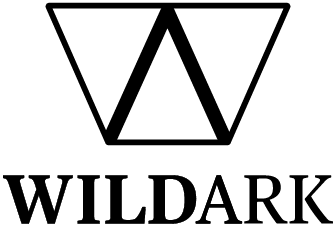Lizzie Corke on the site of her new ecotourism venture Wildlife Wonders that she is establishing near Apollo Bay . © Doug Gimesy
Lizzie Corke is the co-founder of the Conservation Ecology Centre in Australia’s Cape Otway which her and her partner Shayne Neal set up to protect and conserve the biodiversity in the area many years ago. Since then, Lizzie has worked tirelessly to faciliate public/ private partnerships to build effective conservation strategies that engage community and impact change. Her passion and dedication has seen her awarded the 2005 Prime Minister’s Award for Environmentalist of the year. She is also the Director of Ecotourism Australia and Chair of the Corangamite Catchment Management Authority Community Advisory Group. We caught up with Lizzie to find out more about the work she is doing.
WildArk: Where did your dedication to wildlife conservation come from?
Lizzie: My interest in Australian wildlife was kindled a long time ago — and a long way away! I was born in the UK into the midst of a family who love nature. I had a remarkable great aunt, Aunty Marge, who would take me for nature rambles through the North York Moors or the city parks of London — she saw goodness in everything and found nature everywhere, even if it was just a fallen leaf on a pavement, and she shared her sense of wonder with me. My family moved to Australia when I was six and Marge took it upon herself to fill me with fast facts on Australian wildlife before we left — she told me I had to learn as much as I could so that we could explore together in Australia when she came to visit. It was a special link which spanned generations and hemispheres and lifetimes — Marge is no longer here but I share her sense of wonder with my little girl now.
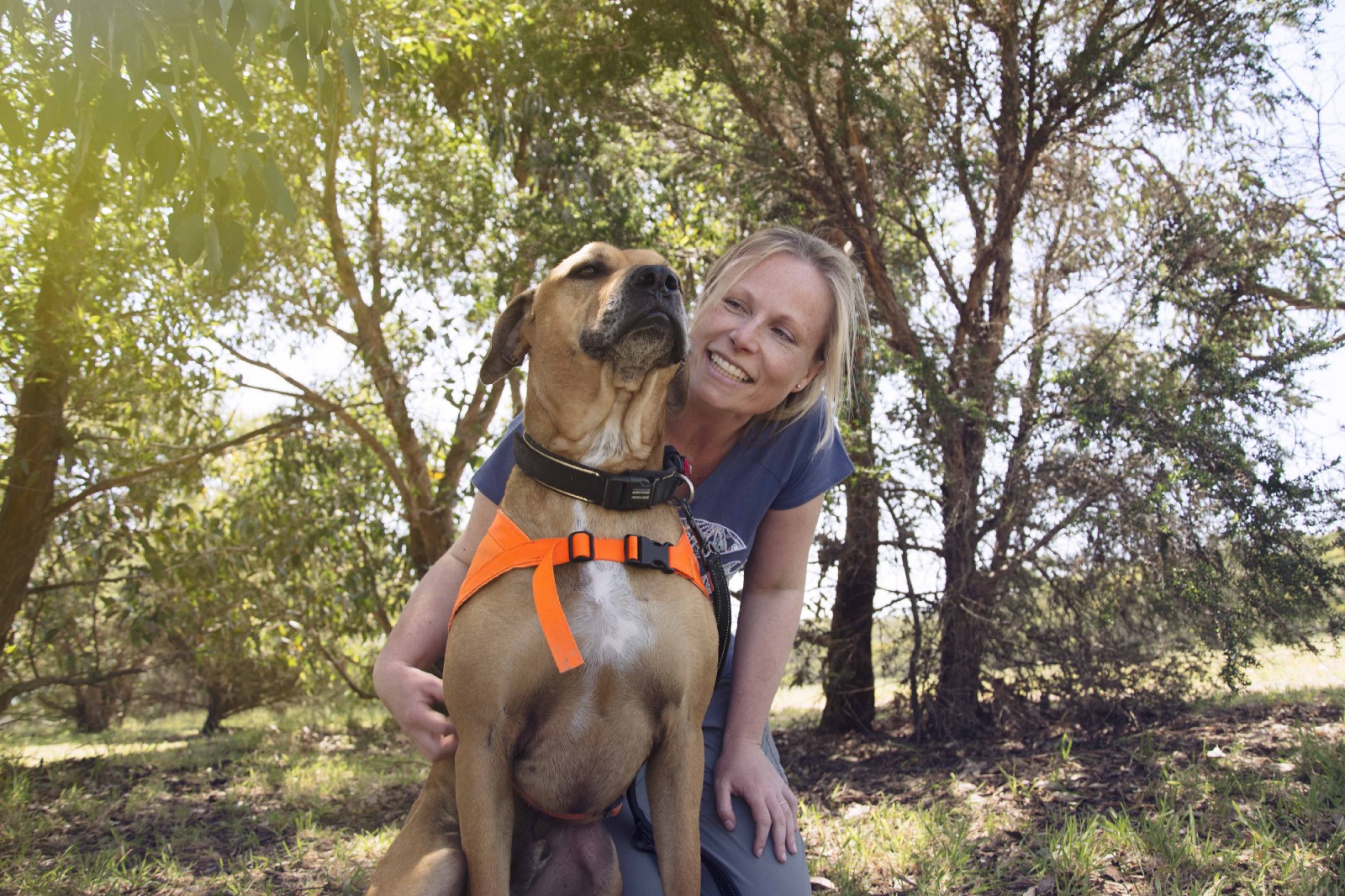
Lizzie with Otways Conservation Dog, Teddy. Photo: © Annette Ruzicka
WildArk: What is so special/unique about the Otways and its wildlife, in your opinion?
Lizzie: The Otways are an incredibly special place. Species that have been lost from many other places still survive in these gullies and forests and heathlands — if we focus our efforts and work together we can ensure that they always will. Another aspect which is important to consider in the Otways landscape is the fact that, while we have extensive areas of public land, there is also a considerable proportion of private land — some with high conservation value and some with significant potential. Through collaboration and a landscape approach (working with ecosystems rather than being confined by artificial boundaries) we can take a very effective approach to conservation, and, in doing so, engage a wide range of people and organisations which helps strengthen efforts even more.
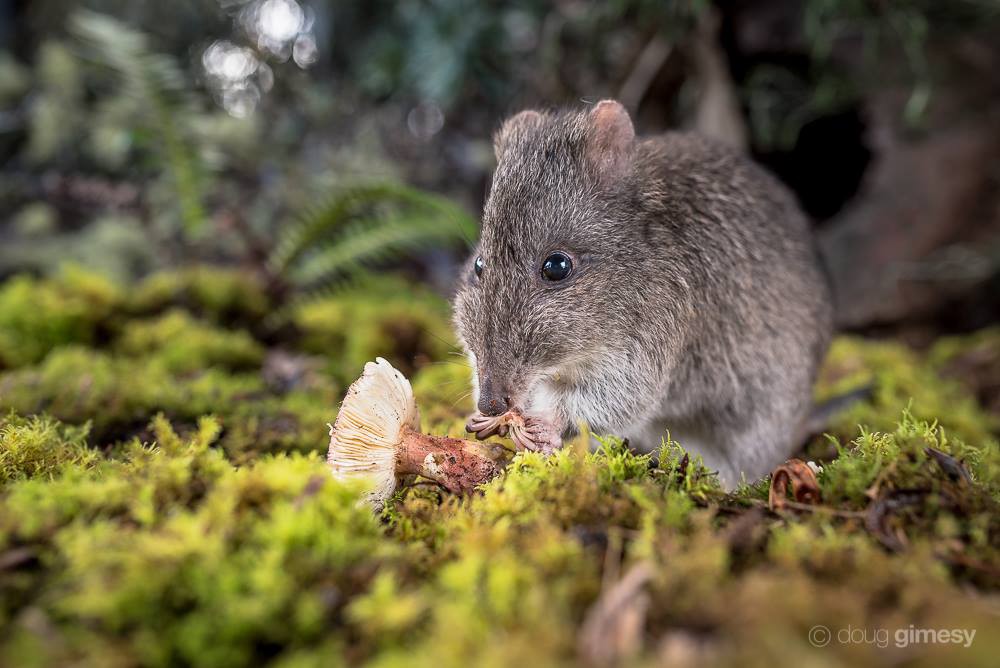
Long-nosed Potoroo. Photo: © Doug Gimesy
WildArk How did the Conservation Ecology Centre come about?
Lizzie: The Conservation Ecology Centre was founded by Shayne Neal and myself in 2000 when we purchased a 165acre paddock alongside what was then the Cape Otway National Park (it has now been extended to become the Great Otway National Park). We wanted to create a special base for conservation in the Otways — as well as a place where we could welcome others to join us in this work. We restored the land and built a beautiful sustainable Ecolodge which we have operated since 2004 to help support our conservation work. The team is now eight strong including both ecotourism and conservation research teams and from our base at Cape Otway we work on projects right across the Otways, incorporating both public and private land. The organisation is set to increase substantially over the next 12 months with the development of a new social enterprise which will allow us to greatly increase the capacity of the organisation and its conservation impact.
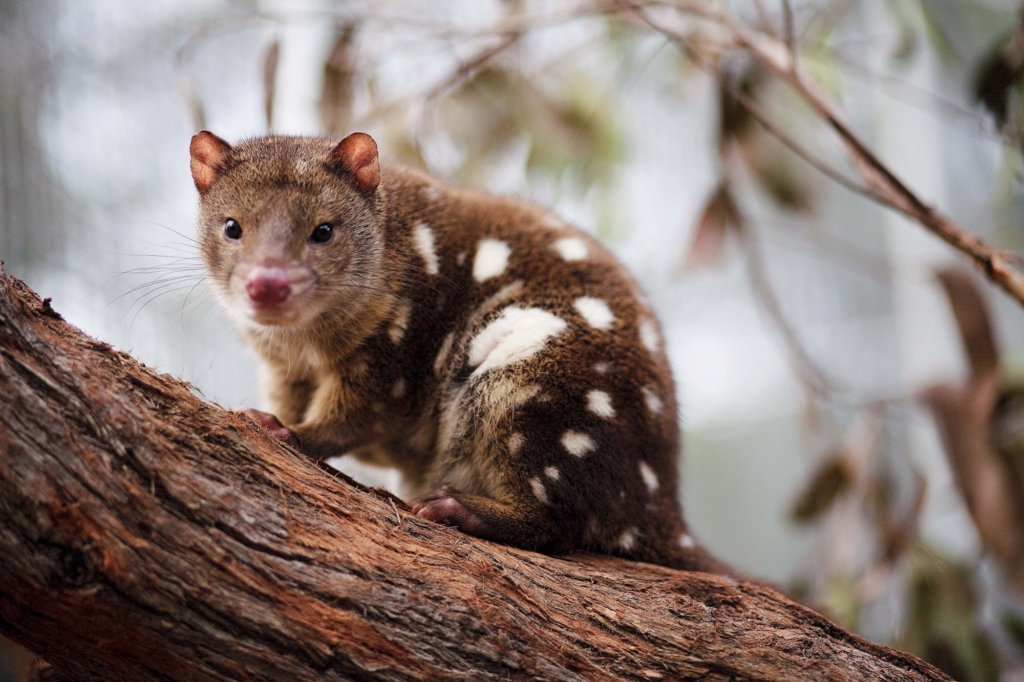
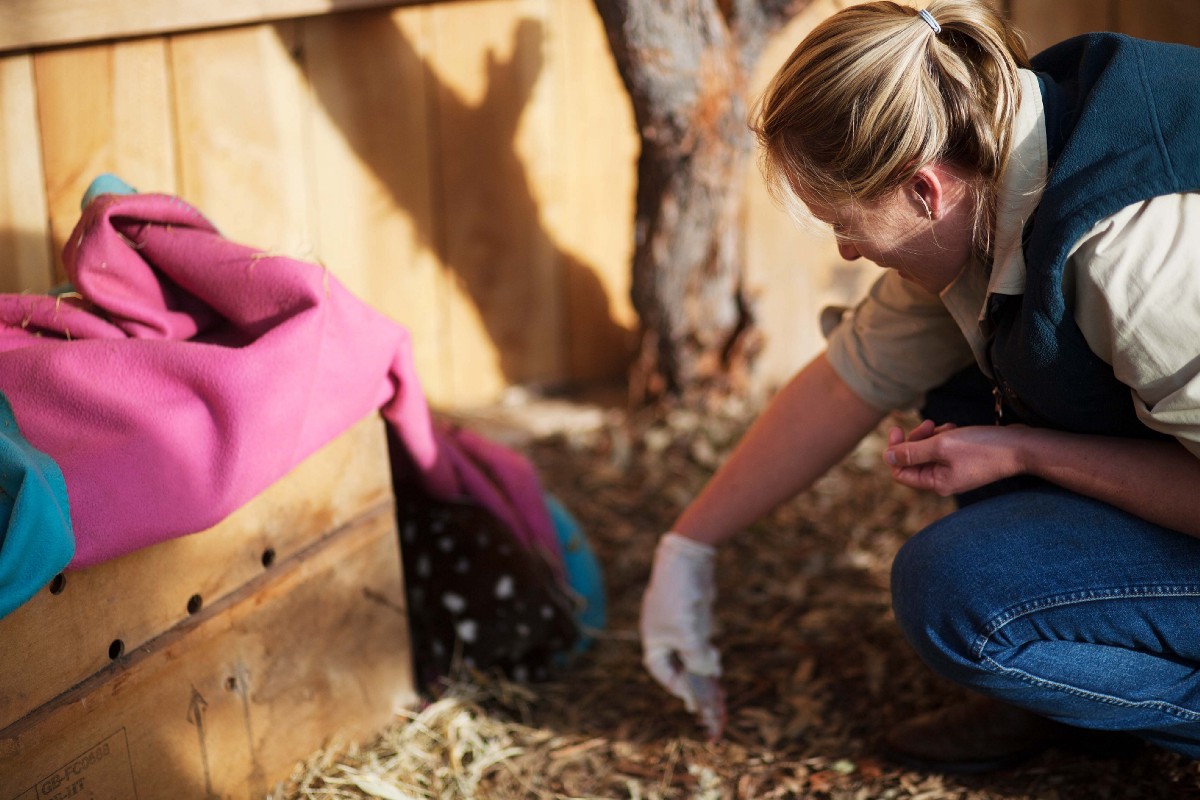
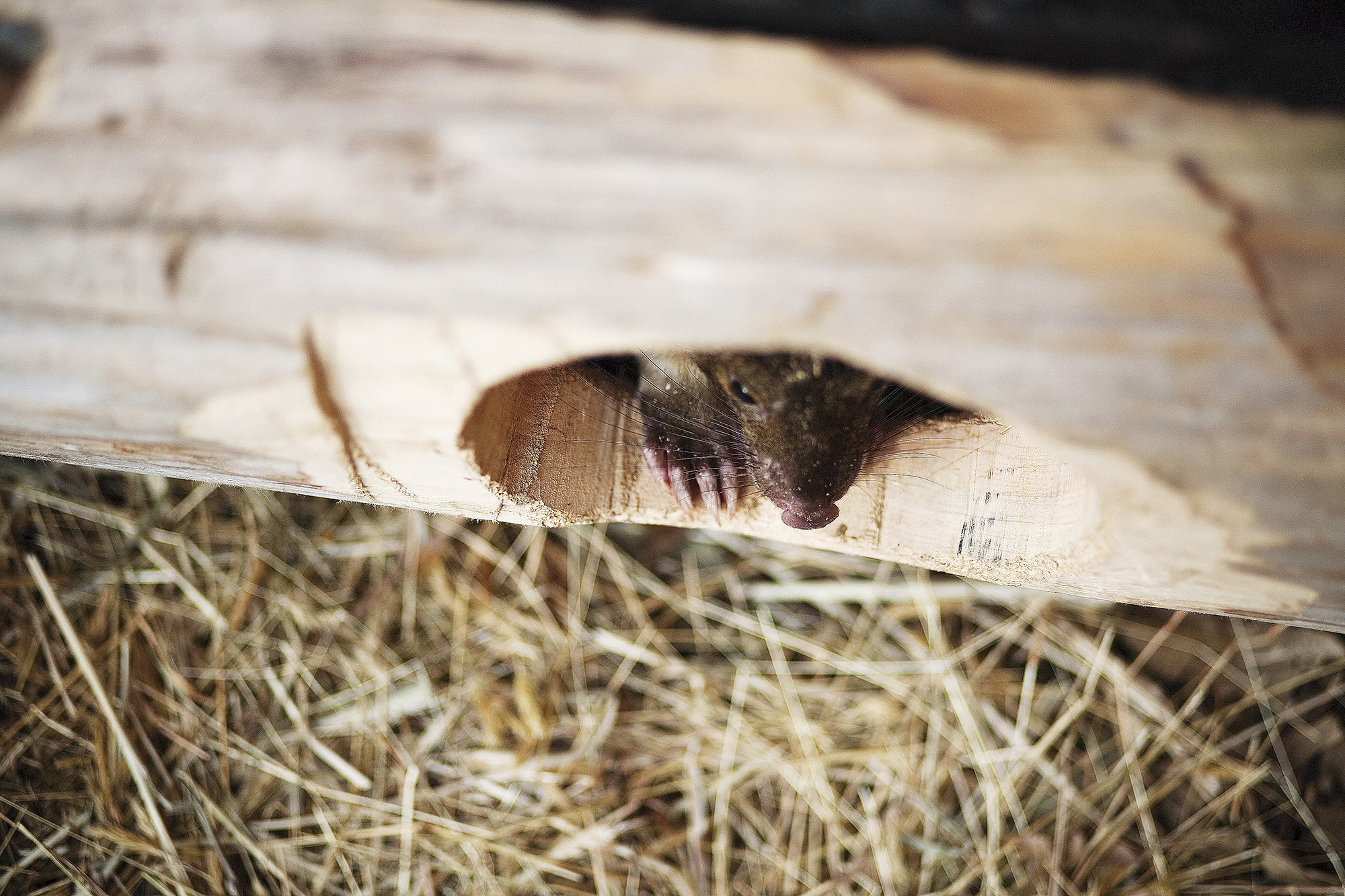
(Top)Tiger quoll. (Bottom Left) Lizzie Corke looking after her Tiger Quolls. Photo: Lucia Griggi; (Bottom Tight) Tiger Quoll hiding. Photo: Lucia Griggi
WildArk: What have been some of the key research projects or milestones that your team has been involved with/ achieved?
Lizzie: CEC is particularly focussed on applied research for threatened species — building knowledge which can help land managers to make the best decisions for conservation. We have created the Otways Threatened Species Network, bringing together the land managers who need up to date and relevant information with the researchers who can answer these critical questions. Our ecologists have compiled information from a wide range of sources, including much which was previously inaccessible, to create the most comprehensive spatial database possible for researchers and managers to work with. We now have a comprehensive dataset (including over 11,000 records of threatened species) that enables us to analyse information, identify key knowledge gaps and then target research that will lead directly to conserving threatened species in the Otways. New information gathered is added to this knowledge base and the network continues to grow, providing an ever stronger base for driving conservation.
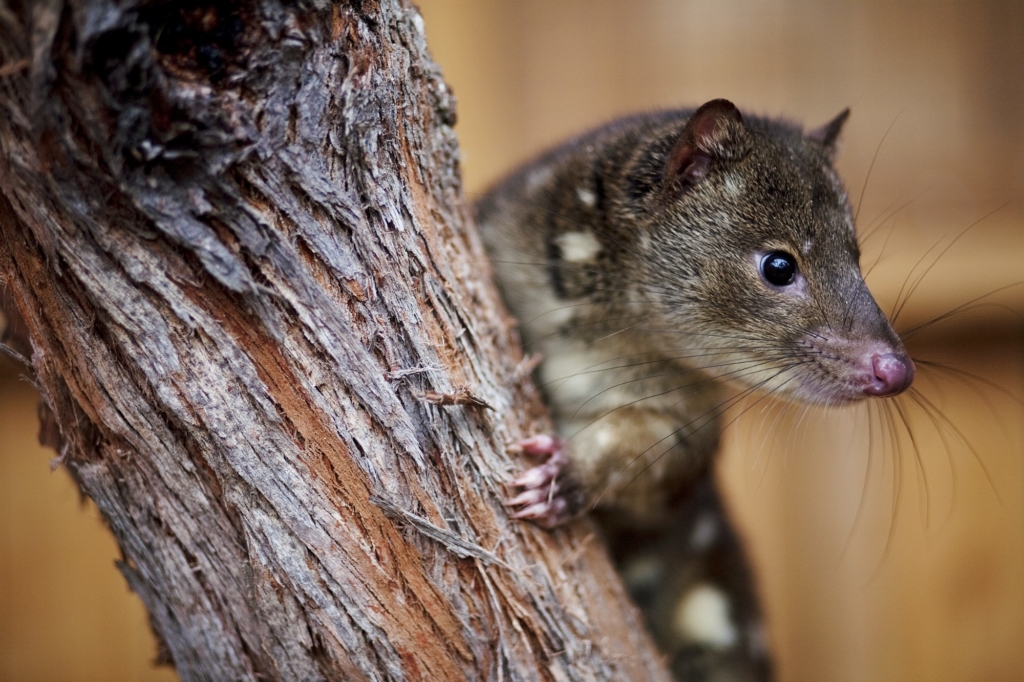
A climbing Tiger Quoll. © Lucia Griggi
An accomplishment I am particularly proud of was the CEC’s rediscovery of the endangered Tiger Quoll in the Otways. With no evidence for nearly a decade this important carnivorous marsupial was presumed locally extinct until we received a call about an odd animal visiting the back deck of a holiday house in Lorne. Based on the description the holiday-makers gave for the animal we arranged for genetic testing of the scat it left behind and the positive result is something which still makes me smile. Since then there have been five pieces of evidence of quolls from different parts of the Otways which is a wonderful affirmation that this important species is still hanging on — but we need more information than that if we are going to help them survive and that’s what keeps us motivated.
WildArk: What role does community play in caring for ecosystems in this area?
Lizzie: The Otways community plays a vital role in caring for the ecosystems of the Otways and people contribute in all sorts of ways. Because the Otways landscape is such a patchwork of public and private land the community are important custodians — with a direct responsibility for caring for vast areas of habitat. Some community members work closely with CEC on specific projects too — whether that is joining us each year for The Big Otway Tree Plant to help restore woodlands or working with us to collect field data for projects such as koala population surveys or small mammal surveys. Some community members even work with us alongside their dogs — training together and passing three rigorous assessments to become conservation detection teams — the Otways Conservation Dogs.
Another wonderful community effort is made by Otway Brewing who produce ‘Spotted Ale’, a beer especially made to help raise awareness of conservation and funds to support it. The rest of our community always contribute to this one most enthusiastically and we are very grateful for that!
As an independent charity we also depend upon financial support — and our community play a key role here too, making donations and pledging bequests to create a legacy for the future of the Otways.
WildArk: What are some of the biggest challenges you’ve faced in conservation here?
Lizzie: One of the greatest risks to the survival of the threatened plants and animals of the Otways is how little we know about them. We don’t know exactly where they occur, how many of them there are, or the effects on them from a wide range of threats such as fire or predation by foxes and cats. This makes it very difficult to direct and measure conservation efforts. This challenge was the catalyst for the Otways Threatened Species Network and we are excited about the opportunities this collaborative approach creates for long term effective conservation.
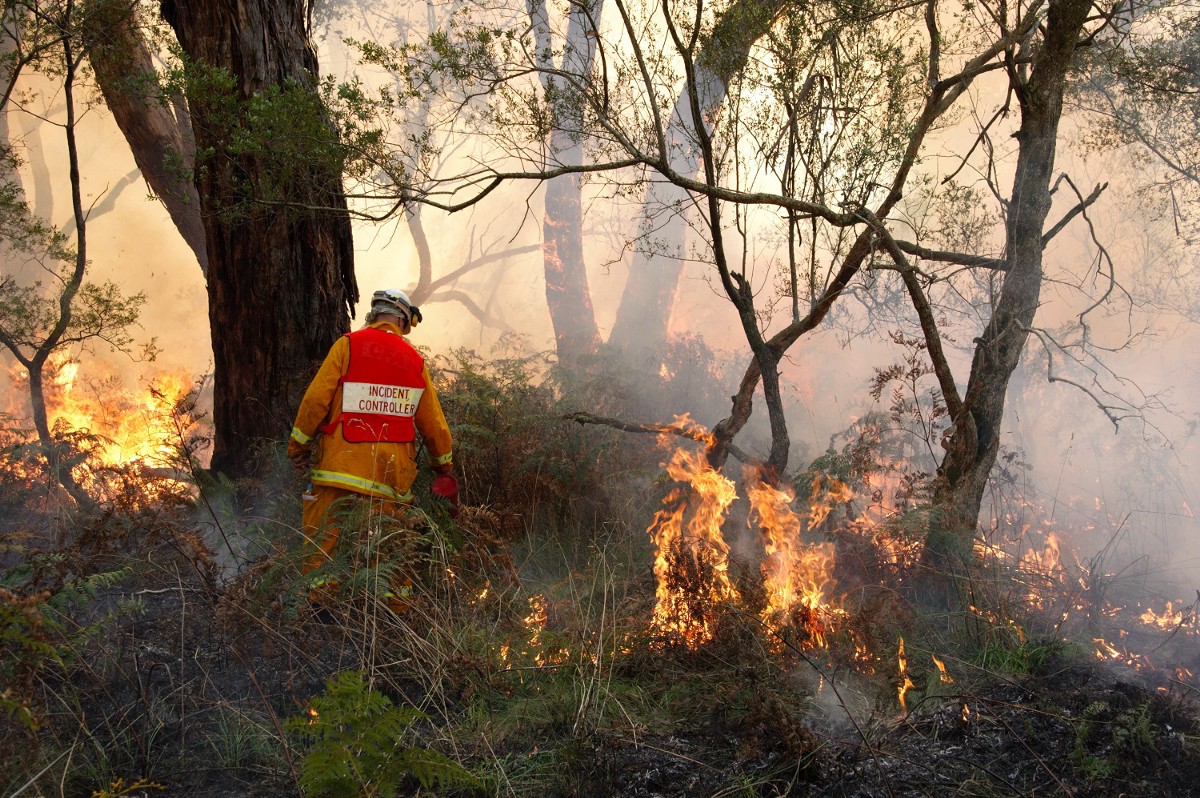
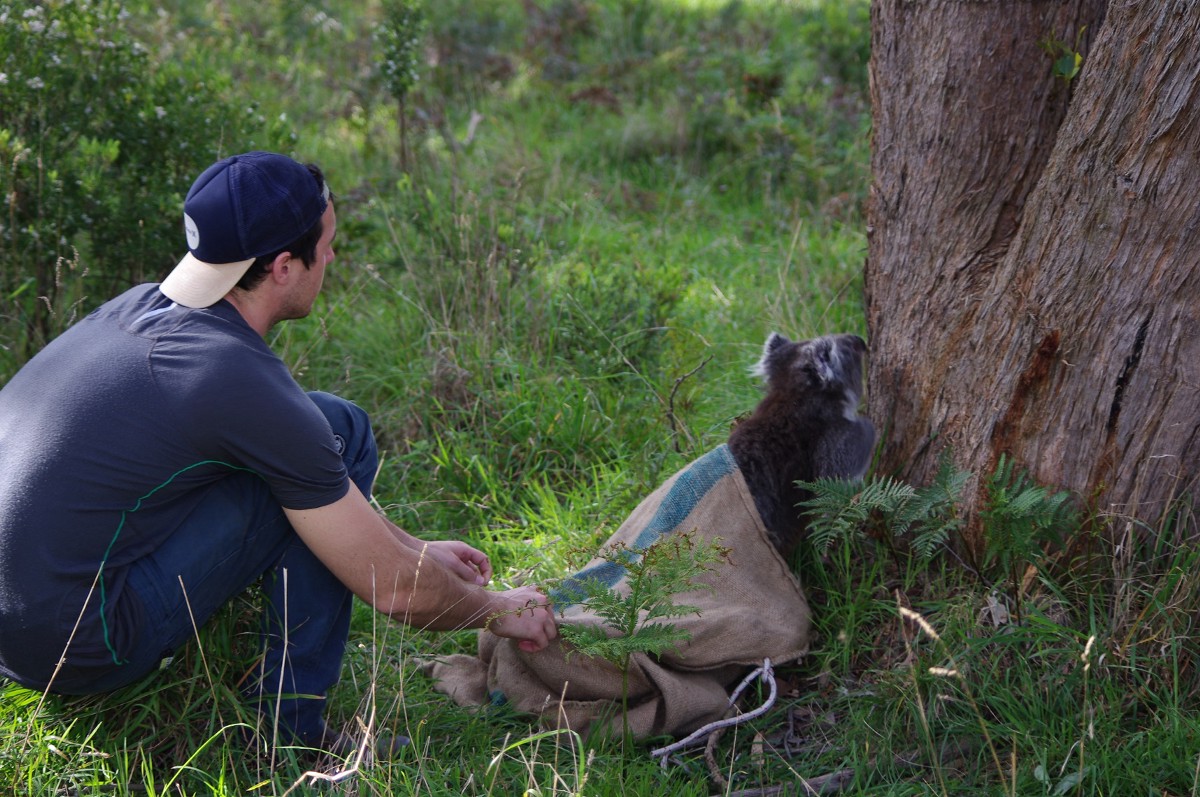
Ecological burning with CFA to restore biodiversity. Photo: © Conservation Ecology Centre (Right) Intern Jarrad Barnes releasing a koala. Photo: © Madeline Brenker
Close to home for us here at Cape Otway we have been grappling with another challenge in the form of devastating declines in manna gum woodlands due to high densities of koalas and changed land management. This crisis affects not only the manna gums and the koalas but also a range of endangered and vulnerable species which call this ecosystem home — including the endangered Leafy Greenhood Orchid and the threatened Long-nosed Potoroo. We are approaching this challenge in a number of ways and with a number of partners — including restoring the land through ecological burning with CFA, replanting to replace the depleted canopy with the Southern Otways Landcare Network and investigating the ecology of koalas with Western Sydney University. Through all of this work we continue to monitor the ecosystems and individual species to constantly improve the efficiency and effectiveness of our conservation efforts.
The greatest challenge for conservation is always the lack of resources — we have the skills to make a huge difference but there is big imbalance between our capacity and our aspirations. We can’t change aspirations of course (that’s not how we roll!) so we are working on a new project that harnesses the power of ecotourism to massively increase CEC’s capacity for conservation.
WildArk: What are the key focus areas for the CEC at the moment?
Lizzie: Right now we are focussed on a number of areas which come together to bring about sustainable and effective conservation. On one hand we are developing and delivering conservation programs, identifying key knowledge gaps and driving research which will enable the best on-ground management for threatened species and ecosystems. On the other hand, our Ecolodge team welcomes visitors from all over the world to stay with us at the Great Ocean Ecolodge, engaging them in our work and generating vital funds to support our work in conservation.
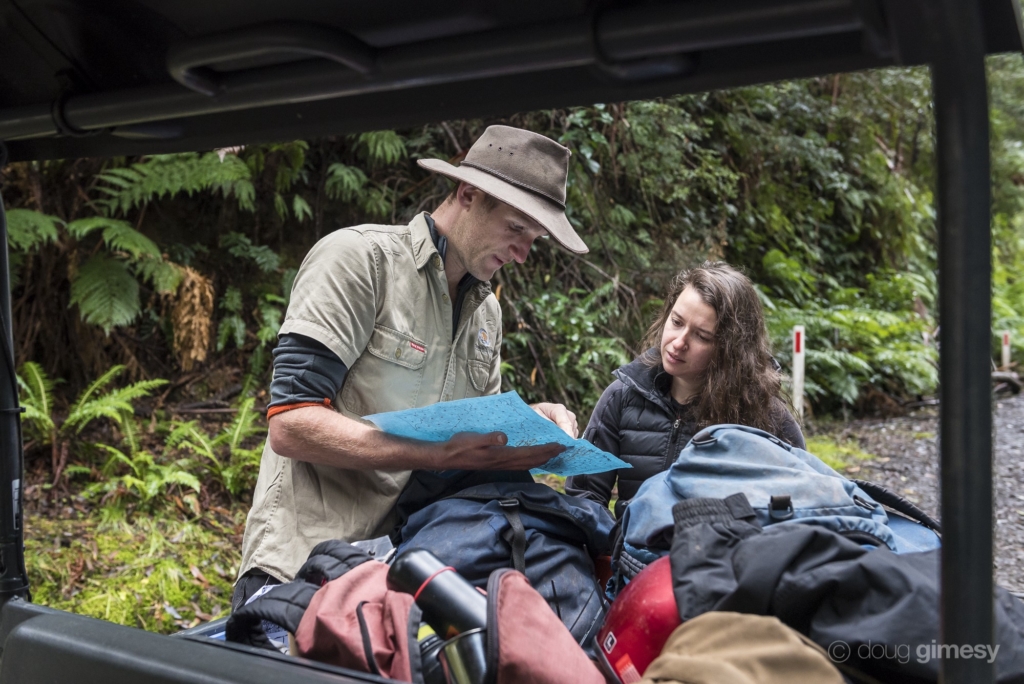
CEC Conservation & Research Manager, Dr Jack Pascoe and Intern Shauni Omond carrying out fieldwork in the Great Otway National Park. Photo: © Doug Gimesy
My key area of focus is currently Wildlife Wonders, a new ecotourism venture CEC is establishing near Apollo Bay which will allow visitors to see the wildlife of the Otways as it used to be, before the arrival of foxes and cats. Accompanied by a conservationist guide visitors will explore a protected habitat area, seeing koalas dozing in the trees, potoroos and bandicoots foraging amongst the ferns and kangaroos hopping along the horizon against a spectacular ocean view. The experience is being designed by the Greens Master of The Lord of the Rings and Art Director of The Hobbit so it will be incredible! As a social enterprise of the CEC all profits generated by Wildlife Wonders will be invested in conservation — it’s a very exciting opportunity for us to create sustainable and reliable funding for conservation.
WildArk: What role does conservation and wilderness play in your family life?
Lizzie: Conservation and wilderness are the constant backdrop to our life as a family. For Shayne and for me it is our life’s work and we discuss and plan constantly — whether at work or at home overlooking the Great Otway National Park (generally with a couple of conservation detection dogs asleep on the couch!).
As the organisation develops I find myself spending increasing amounts of time in the office or in the city — when things are busy I have to become mindful of balancing this with time in the wilderness so I can stay grounded and manage my work effectively. Sometimes I can only manage a quick walk or make a conscious effort to put away the phone and look out of the train window — not sure that really counts as wilderness but it makes a huge difference.
WildArk: What are you most proud of with regards to your organisations conservation work?
Lizzie: I am most proud of our team and our approach to conservation. The CEC team is extraordinary — they are highly skilled, innovative, dedicated and thoughtful. With extremely limited resources they take on a lot and they get it done. A large part of this success is based on our approach — we actively develop strong partnerships and pool skills, expertise and other resources to accomplish outcomes which are far beyond anything each partner could achieve individually.
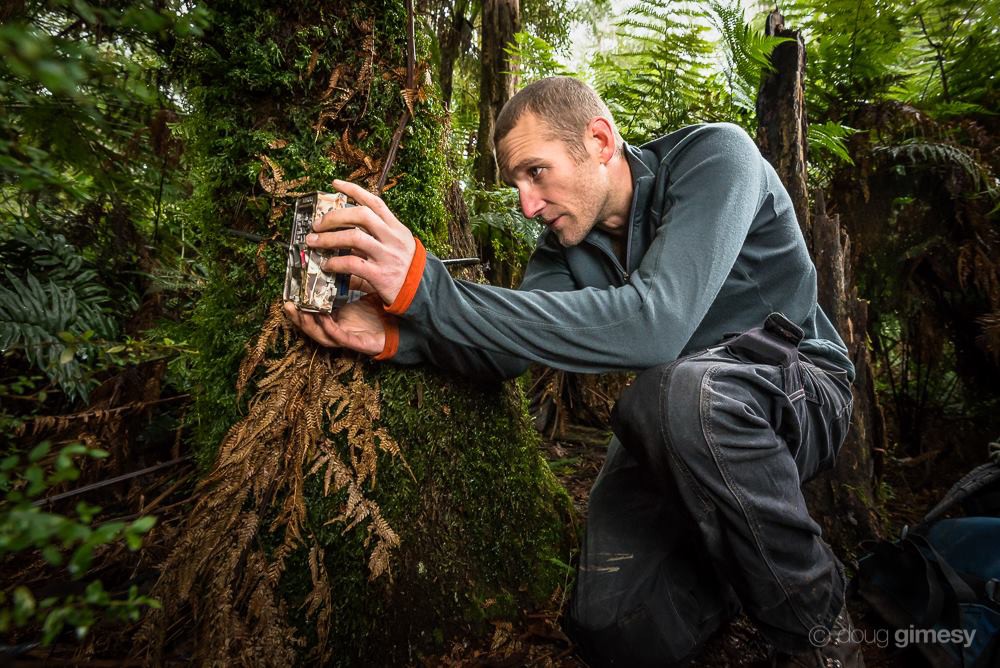
CEC Conservation & Research Manager, Dr Jack Pascoe setting up a camera trap. Photo: © Doug Gimesy
WildArk: What is your greatest hope for the future of conservation in Australia?
Lizzie: My hope is that rather than bouncing from crisis to crisis, conservation organisations will exist to drive constant improvement of best practise. I hope that the sorts of special wildlife encounters that Wildlife Wonders will offer will become commonplace as species are restored across the landscape — that we can restore species without needing to create fenced areas.
I believe that we can do our best if we maintain focus and don’t allow ourselves to become too overwhelmed. For me that means focussing on our corner of the world. I want the children of the Great Ocean Road to grow up loving nature and I want them to have every opportunity to pursue lives which allow them to contribute to that. Secure jobs and a thriving community are critical to conservation and we can achieve it all if we recognise the inextricability of our environment, our economy and our community.
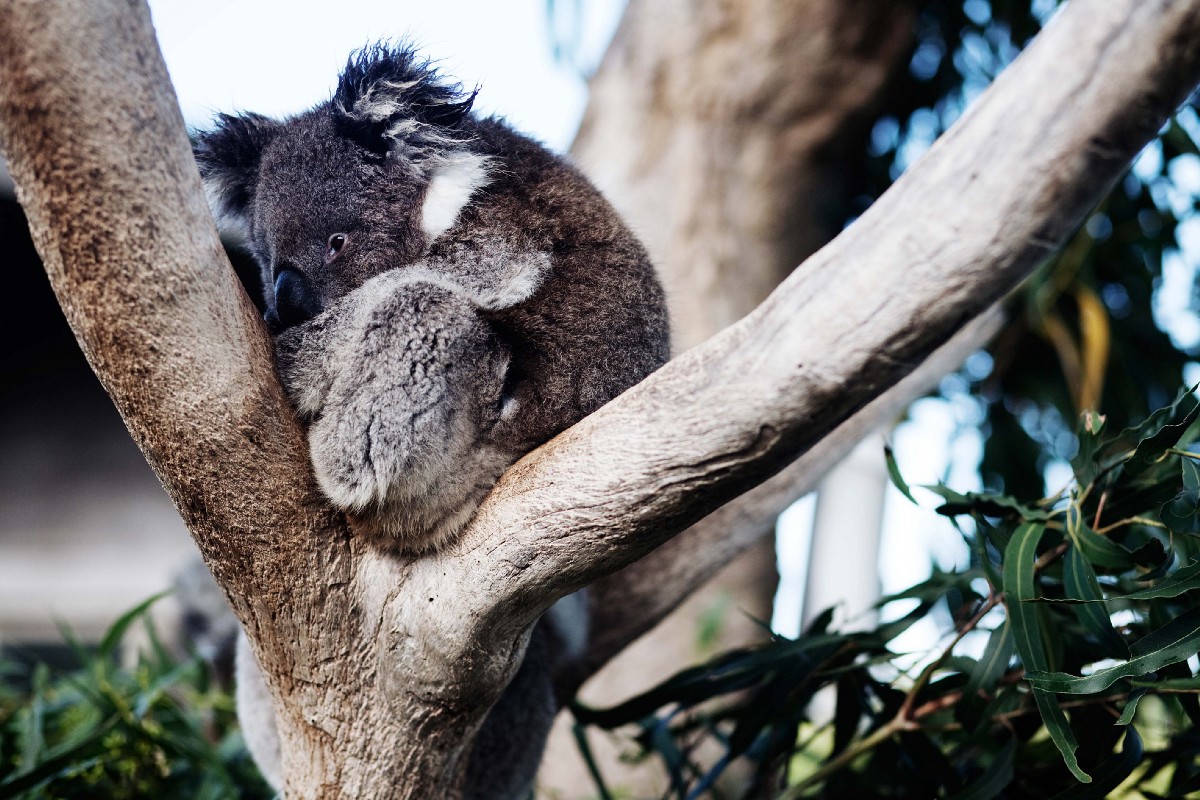
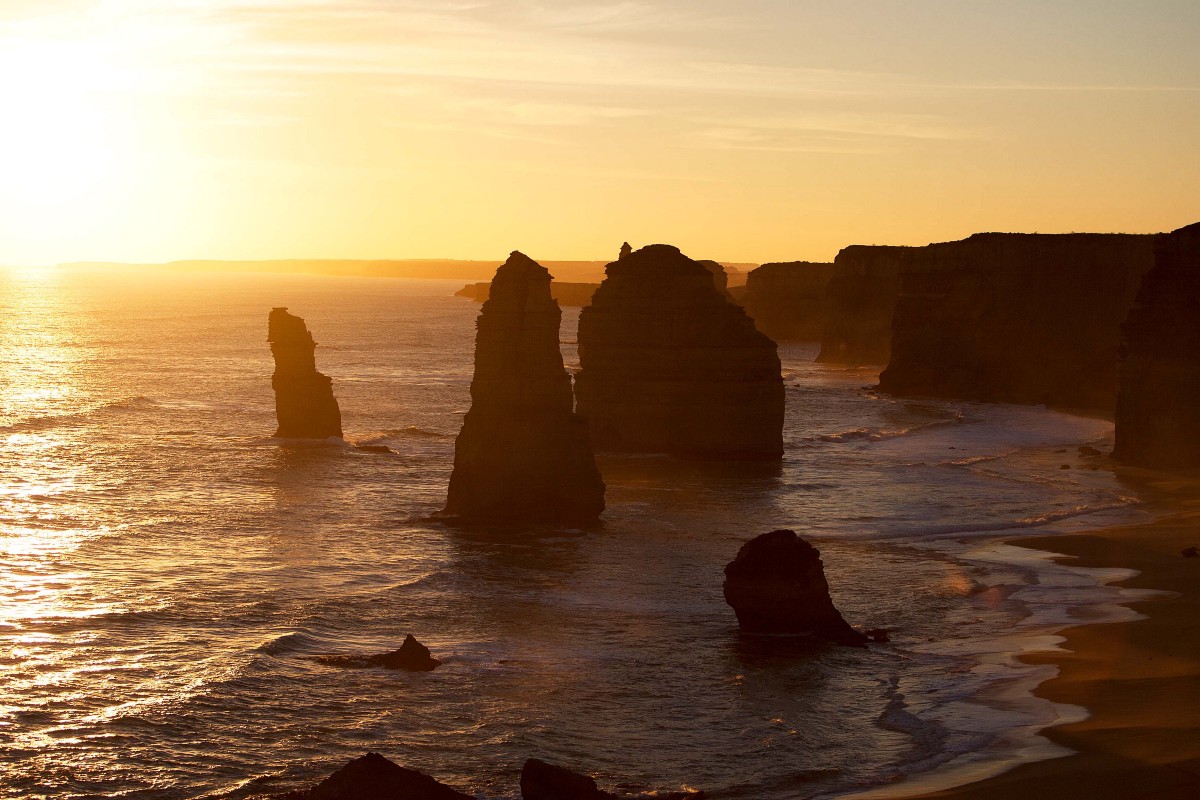
Resident Koala at the Otway Conservation and Ecology Centre. (Right) Sunset at the Twelve Apostles on the Great Ocean Road. Photo: © Lucia Griggi
WildArk: What inspires you?
Lizzie: I am inspired by so many things! The kangaroos grazing on the lawn, the first Scarlet Robin of winter, people who go out of their way to do something wonderful for someone else, innovative solutions to problems which had seemed insurmountable….
WildArk: What does the word wild mean to you?
Lizzie: What a great question. ‘Wild’ to me means independent, unpredictable and resilient — things with a purpose all of their own and things we can never fully understand. It is the giant mountain ash and the tiny feather tail glider.
Support Lizzie’s work by visiting https://www.conservationecologycentre.org
